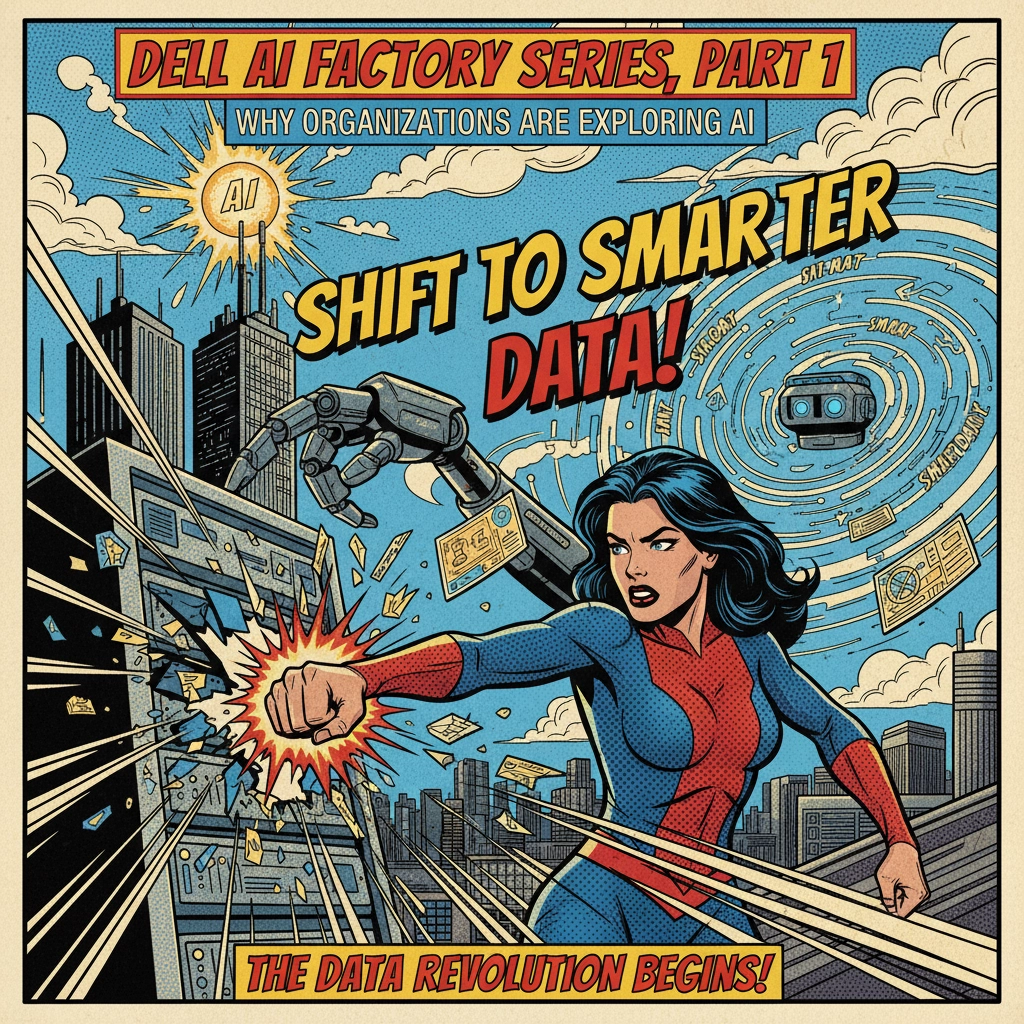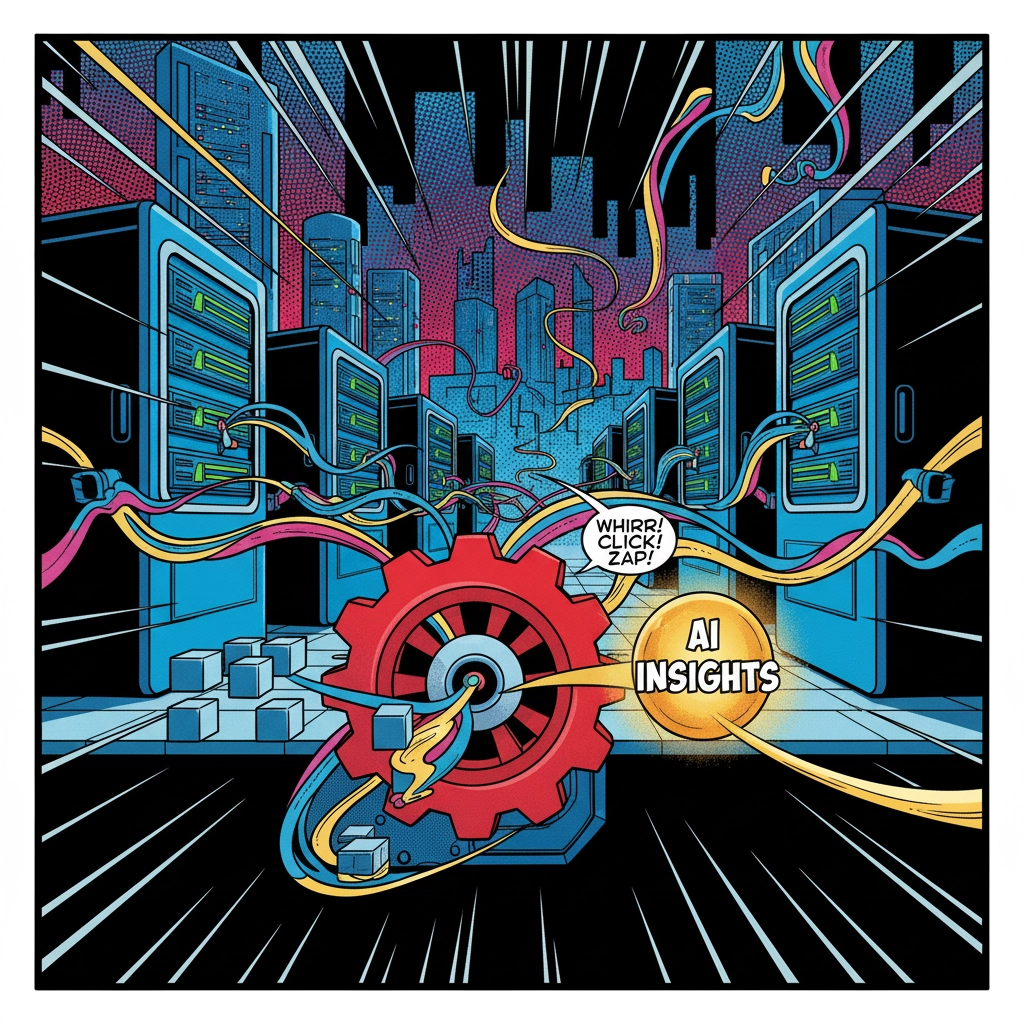
The artificial intelligence revolution has reached a critical inflection point. Organizations across government, healthcare, education, and private sectors are no longer asking whether they should adopt AI: they are racing to determine how quickly they can implement it effectively. This urgency stems from a fundamental reality: AI adoption has become an imperative for organizational survival rather than merely a competitive advantage.
The current AI transformation differs dramatically from previous technological shifts in both speed and scope. While past innovations took years or decades to fully permeate organizations, AI adoption is accelerating at an unprecedented pace. More importantly, AI's potential impact touches virtually every aspect of organizational operations, from decision-making processes to service delivery and resource optimization.
The Data Management Imperative
At the heart of every successful AI implementation lies a critical foundation: effective data management. Organizations are discovering that their existing data infrastructure, designed for traditional computing workloads, cannot support the rigorous demands of AI applications. This realization is driving a fundamental shift in how organizations approach data as a strategic asset.
The challenge extends beyond simply having large volumes of data. Modern AI applications require high-quality, accessible, and properly governed data that can be rapidly processed and analyzed. Organizations must transform their data from a byproduct of operations into the primary fuel for their AI initiatives. This transformation requires new approaches to data collection, storage, processing, and governance.

Government agencies, for instance, often possess vast datasets that could revolutionize public service delivery through AI-powered insights. However, these datasets frequently exist in siloed systems with inconsistent formats and varying quality standards. Healthcare organizations face similar challenges, where patient data across multiple systems could enable breakthrough diagnostic AI applications, but integration and privacy concerns create significant barriers.
Educational institutions are discovering that AI can personalize learning experiences and improve administrative efficiency, but only when their student information systems, learning management platforms, and research databases can work together seamlessly. Each sector faces unique data challenges, but the underlying need remains consistent: organizations require a comprehensive approach to data management that enables AI success.
Common Pitfalls in AI Implementation
Research indicates that a significant percentage of AI projects fail to deliver expected value, often due to inadequate data preparation and management. Organizations frequently underestimate the complexity of preparing data for AI applications, leading to implementations that produce unreliable results or fail to scale effectively.
One prevalent challenge involves data quality issues. Organizations may possess extensive datasets, but if these contain inconsistencies, duplicates, or missing information, AI models trained on this data will produce unreliable outcomes. Additionally, many organizations struggle with data accessibility, where relevant information exists but remains locked in disparate systems that cannot easily communicate with AI platforms.
Another common pitfall involves the lack of proper data governance frameworks. Without clear policies for data access, security, and compliance, organizations risk creating AI implementations that violate regulatory requirements or compromise sensitive information. This concern is particularly acute for government agencies handling citizen data and healthcare organizations managing patient information.
The infrastructure challenge represents another significant barrier. Traditional data centers and storage solutions were not designed to handle the computational demands of modern AI workloads. Organizations attempting to run AI applications on inadequate infrastructure often experience performance bottlenecks that render their AI initiatives ineffective.
The Dell AI Factory Approach
Dell Technologies has developed a comprehensive framework to address these challenges through the Dell AI Factory approach, built in partnership with NVIDIA. This methodology recognizes that successful AI implementation requires more than just powerful computing hardware: it demands a holistic approach to data management, infrastructure design, and operational processes.
The Dell AI Factory concept treats AI development and deployment like a manufacturing process, where raw data serves as the input material and actionable intelligence represents the finished product. This approach emphasizes the importance of optimizing every step in the data-to-insight pipeline, from initial data collection through final AI model deployment and maintenance.
Central to this approach is the recognition that Dell servers and Dell storage solutions must work together seamlessly to support AI workloads. Dell PowerEdge servers, specifically designed for AI applications, provide the computational power necessary for training and inference, while Dell storage systems ensure that data remains accessible and protected throughout the AI lifecycle.

The Dell NVIDIA partnership enhances this foundation by integrating advanced GPU acceleration directly into Dell's server and storage infrastructure. This integration eliminates compatibility concerns and optimization challenges that organizations often face when attempting to build AI systems from disparate components.
Introducing the Seven-Step Framework
The Dell AI Factory methodology centers on a seven-step framework for effective AI data management. This systematic approach guides organizations through the process of identifying business needs, discovering relevant data sources, and implementing sustainable AI solutions that deliver measurable value.
The framework begins with clearly defining the business problem or opportunity that AI will address. This step ensures that technical implementation efforts align with organizational objectives and success metrics. Too many AI projects fail because they focus on implementing impressive technology without clearly articulating the business value they intend to deliver.
Subsequent steps in the framework address data discovery and preparation, model development and training, deployment processes, and ongoing maintenance and optimization. Each step builds upon the previous ones, creating a comprehensive pathway from initial concept to operational AI implementation.
This systematic approach proves particularly valuable for organizations that lack extensive AI expertise internally. Rather than attempting to navigate the complex AI landscape independently, organizations can follow a proven methodology that addresses common challenges and incorporates best practices developed through extensive real-world implementations.
The framework also emphasizes the importance of scalability from the initial planning stages. Organizations that begin with small pilot projects must ensure their underlying infrastructure and processes can support expanded AI initiatives as confidence and capabilities grow.
The Infrastructure Foundation
Successful AI implementation requires infrastructure that can handle the unique demands of machine learning workloads. Unlike traditional applications that primarily require processing power and storage capacity, AI applications demand high-performance computing capabilities, massive data throughput, and sophisticated memory management.
Dell AI servers provide the specialized hardware architecture necessary for these demanding workloads. These systems integrate advanced processors, high-bandwidth memory, and optimized storage interfaces to ensure that AI applications can access and process data efficiently. The server designs incorporate thermal management and power optimization features that enable sustained high-performance operation.
Storage requirements for AI implementations extend beyond traditional capacity considerations. AI applications require storage systems that can deliver consistent high-throughput data access while maintaining data integrity and availability. Dell storage solutions designed for AI workloads provide the performance characteristics necessary to prevent data access bottlenecks that could limit AI model training and inference speed.

The integration between Dell servers and storage systems creates a unified platform that simplifies AI infrastructure management while optimizing performance. Organizations can focus on developing and deploying AI applications rather than managing complex infrastructure integration challenges.
Looking Ahead: Building Your AI Foundation
Organizations exploring AI implementation face a complex landscape of technological options, vendor solutions, and architectural decisions. The key to success lies in adopting a systematic approach that addresses both immediate AI implementation needs and long-term scalability requirements.
The Dell AI Factory framework provides a proven methodology for navigating this complexity. By following the seven-step process, organizations can avoid common pitfalls while building AI implementations that deliver sustainable business value.
In the next installment of this series, we will explore each of the seven steps in detail, providing practical guidance for implementation and highlighting how organizations can leverage this framework to accelerate their AI initiatives. We will examine specific strategies for data discovery, preparation, and governance that form the foundation of successful AI implementations.
Organizations ready to begin their AI journey should focus on building strong data management foundations while ensuring their infrastructure can support current and future AI requirements. The investment in proper planning and infrastructure today will determine the success and scalability of AI initiatives tomorrow.
Optrics Engineering works with organizations across all sectors to develop comprehensive AI implementation strategies that align with their specific requirements and objectives. Our expertise in Dell technologies and infrastructure design positions us to guide organizations through every stage of their AI transformation journey. As we continue to expand our AI consulting services, we remain committed to helping organizations unlock the full potential of their data through strategic AI implementations.


